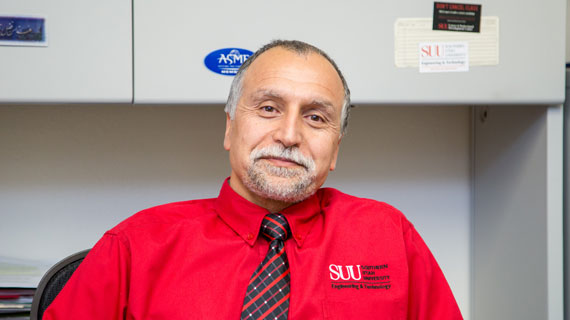7 Tips to Surviving the Engineering Program at SUU
Posted: August 22, 2016 | Author: Lexi Carter | Read Time: 3 minutes
 Southern Utah University’s ABET accredited Engineering bachelor’s degree program acquaints students with a broad range of Engineering possibilities. Students get to experience courses that cover electrical, mechanical, and civil engineering. It is the only truly integrated Engineering program offered anywhere in the state of Utah and it is excellent preparation for graduate school or to begin a career in the Engineering field.Engineering classes are small at Southern Utah University and students learn in labs that are modern and feature the latest technology. Lower division Engineering courses typically include no more than 25-30 students. Upper division classes usually have no more than 15 students each. This gives students extraordinary access to their instructors who become excellent advisors and work side by side with students helping ensure they thoroughly understand key Engineering concepts.
Southern Utah University’s ABET accredited Engineering bachelor’s degree program acquaints students with a broad range of Engineering possibilities. Students get to experience courses that cover electrical, mechanical, and civil engineering. It is the only truly integrated Engineering program offered anywhere in the state of Utah and it is excellent preparation for graduate school or to begin a career in the Engineering field.Engineering classes are small at Southern Utah University and students learn in labs that are modern and feature the latest technology. Lower division Engineering courses typically include no more than 25-30 students. Upper division classes usually have no more than 15 students each. This gives students extraordinary access to their instructors who become excellent advisors and work side by side with students helping ensure they thoroughly understand key Engineering concepts.
Engineering is a hands-on program at SUU. Every course requires the completion of projects through which students demonstrate their understanding of the key concepts covered. In addition, through the capstone design project undertaken during the junior and senior years, each student plans, designs, and builds a scale model of a solar home that is fully tested for its thermal dynamics.
By the time students graduate from the SUU Engineering program, they are confident of their abilities to be accepted into an excellent graduate school program or begin a job in the Engineering field.
Visit SUU's engineering and technology page.
7 Tips to Surviving the Engineering Program at SUU from suutbirds
Do your homework. Prepare for 2 - 5 hours of homework everyday. If you buckle down during the week and study, then you'll have free weekends most of the time (except around midterms and finals). Study time is VITAL to your understanding of the principles and success in the program.
Math is everything. You'll be doing a mix of research, lab work, lab write-ups, story problems, etc. - all involving loads of math.
Your junior year will be the hardest. More often than not, the classes are stacked so your junior year is super intense. Create study groups with your classmates to help prepare for tests and complete hard assignments.
Take math and English to prepare for the program. Take up to Calculus I and the scientific writing class as preparation courses for the program. You'll need the math for all of your engineering courses and the writing class will help with all of your lab reports.
Utilize the Engineering Club. Have hands-on opportunities to build and test a variety of projects and to network for internships and jobs. SUU also has an Engineers without Borders chapter that can take you abroad to serve and implement things you've learned in the classroom.
Land an internship. Gain invaluable experience interning while in school or during the summer. Learn from working industry experts and convert your education to usable knowledge.
Work with your professors. The people who teach you are literally experts in the field. Hours and hours of research and study have gone into them standing in front of the classroom. Work with them on outside projects and connect for different internship opportunities, and perhaps they will like you enough to write a letter of recommendation for you.
This article was published more than 3 years ago and might contain outdated information or broken links. As a result, its accuracy cannot be guaranteed.
Tags: Blog Majors Engineering



